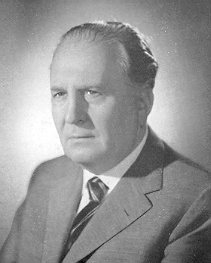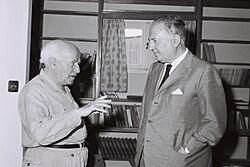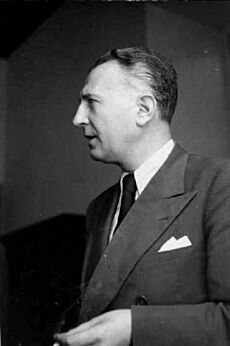Randolfo Pacciardi facts for kids
Quick facts for kids
Randolfo Pacciardi
|
|
|---|---|
 |
|
| Minister of Defence | |
| In office 23 May 1948 – 16 July 1953 |
|
| Prime Minister | Alcide De Gasperi |
| Preceded by | Cipriano Facchinetti |
| Succeeded by | Giuseppe Codacci Pisanelli |
| Deputy Prime Minister | |
| In office 15 December 1947 – 12 May 1948 |
|
| Prime Minister | Alcide De Gasperi |
| Preceded by | Paolo Cappa Vincenzo Moscatelli |
| Succeeded by | Attilio Piccioni Giovanni Porzio Giuseppe Saragat |
| Member of the Chamber of Deputies | |
| In office 8 May 1948 – 4 June 1968 |
|
| Constituency | Pisa (1948–53; 1958–68) Italy at-large (1953–58) |
| Member of the Constituent Assembly | |
| In office 25 June 1946 – 31 January 1948 |
|
| Constituency | Pisa |
| Personal details | |
| Born | 1 January 1899 Gavorrano, Italy |
| Died | 14 April 1991 (aged 92) Rome, Italy |
| Political party | PRI (1915–64; 1980–91) UDNR (1964–80) |
| Parents | Giovanni Pacciardi, Elvira Guidoni |
| Alma mater | University of Siena |
| Profession | Lawyer, politician, journalist |
| Military service | |
| Allegiance | Italy Spanish Republic |
| Branch/service | Royal Italian Army International Brigades |
| Years of service | 1917–1919; 1936–1939 |
| Rank | Lieutenant colonel |
| Unit | 11th Bersaglieri Regiment 8th Bersaglieri Regiment Garibaldi Battalion |
| Battles/wars | World War I (1914–1918)
Spanish Civil War (1936–1937) |
Randolfo Pacciardi (born January 1, 1899 – died April 14, 1991) was an important Italian politician. He was a long-time member of the Italian Republican Party, a political group that believed in a republic and was not tied to a specific religion.
Pacciardi was strongly against fascism, a type of government where one leader has total power. Because of his beliefs, he had to live away from Italy for many years. He also served as an officer in the International Brigades during the Spanish Civil War. After World War II, he played a big role in Italian politics. He believed Italy should have a presidential republic, where a president has more power, similar to the United States.
Contents
Randolfo Pacciardi's Life Story
Early Years and World War I
Randolfo Pacciardi was born in Giuncarico, a small town in southern Tuscany, Italy. In 1915, when he was 16, he joined the Italian Republican Party. He believed Italy should join World War I, so he enrolled in the army's officer school. He fought in the war and was recognized for his bravery, earning several medals from Italy, Britain, and France.
After the war, in 1921, he earned a law degree from the University of Siena. He also worked for a local newspaper called L'Etruria Nuova.
Fighting Against Fascism
In 1922, Pacciardi moved to Rome. He was very against the rising violence of Fascist groups. In 1923, he started an anti-fascist group for war veterans called Italia Libera (Free Italy). This group was one of the few that planned to fight back against Benito Mussolini, the Fascist leader. Because of this, Italia Libera was one of the first opposition groups banned by the government in 1925.
When the Fascists made all other political parties illegal in November 1926, Pacciardi was ordered to live in exile within Italy for five years. However, he managed to escape to Austria and then to Switzerland. While in Switzerland, he helped other anti-fascists, like Sandro Pertini, who later became the President of Italy.
In 1933, the Italian government pressured Switzerland to expel anti-fascist refugees. This forced Pacciardi to move again, this time to France.
Fighting in the Spanish Civil War
When the Spanish Civil War began, Pacciardi helped create and lead the Italian Legion. This group was later called the Garibaldi Battalion and became part of the International Brigades. These brigades were made up of volunteers from different countries who fought to support the Second Spanish Republic against the Fascist forces.
Pacciardi wanted to create a non-political group of volunteers. He met with the Spanish Prime Minister, but his idea was only accepted when the Comintern (a worldwide communist organization) decided to form the larger International Brigades. In October 1936, anti-fascist parties agreed to form the Garibaldi Battalion, and Pacciardi was chosen as its commander because of his military experience.
He led the Garibaldi Battalion in important battles like the Siege of Madrid and the battle of Jarama, where he was wounded. He was seen as a good leader and was respected by his soldiers. The Battle of Guadalajara was special because it was the first time Italians fought against each other in the civil war, with Pacciardi's forces fighting against Italian troops sent by Mussolini.
Even though the International Brigades were mostly controlled by Communists, the Garibaldi Battalion under Pacciardi was known for being open to different political views. It had Communists, Socialists, and Republicans, and even many anarchists. Pacciardi left Spain in October 1937.
World War II and Return to Italy
After leaving Spain, Pacciardi moved to Paris. There, he started a weekly magazine called La Giovine Italia (Young Italy). He also traveled to the United States in 1938 to give talks about anti-fascism and raise money for the Spanish Republic.
When Germany invaded France in 1940, Pacciardi had to flee again. He and his wife reached New York in December 1941, after a long journey using fake documents. In the United States, Pacciardi supported the Mazzini Society, a group of Italian-Americans who wanted to organize volunteers to fight with the Allied forces in World War II. However, it was hard to recruit enough people.
Pacciardi returned to Italy in June 1944, after Rome was freed. He immediately joined the leadership of the PRI, which had been re-established. He was against working with the Italian monarchy. In 1945, he became the national secretary of the PRI. The next year, he was elected to the Constituent Assembly of Italy, which was a special group that wrote Italy's new constitution.
After Italy became a republic in 1946, the Republican Party joined the government for the first time. In 1947, when the Communist and Socialist parties were removed from the government, the PRI initially did not support the new government. Pacciardi first wanted to keep working with the Communists. However, by December 1947, he changed his mind because he saw a growing threat from the Soviet Union. He then became Deputy Prime Minister.
After the Constitution was approved, he was elected to Parliament in 1948. He served as Defense Minister from 1948 to 1953. During this time, he supported Italy joining NATO, even though some in his own party disagreed. He also helped rebuild the Italian army and started the yearly military parade on Republic Day, which is still celebrated today. He also supported the idea of European federalism, which means European countries working closely together.
Later Political Views
In the 1950s, Pacciardi became very strong in his opposition to Communism. He believed that Italy needed a presidential system of government to make politics more stable. He even suggested, in private, that a coup d'état (a sudden, illegal takeover of government) might be needed to create a new constitution with a powerful president, like in France.
In 1963, when the Christian Democratic party formed a government that included Socialist ministers, Pacciardi voted against it. Because of this, he was expelled from his party, the PRI.

After leaving the PRI, he started a new party called the Democratic Union for the New Republic (UDNR). However, his new party did not gain much support from the public. In the 1968 election, his party received very few votes and none of its members were elected to Parliament.
His political work continued in the 1970s. In 1974, a prosecutor accused him of planning a coup attempt, known as the golpe bianco, with another former Resistance fighter named Edgardo Sogno. The charges were dropped in 1978. However, in 2000, Sogno said that he and Pacciardi had indeed planned a "liberal coup" to prevent Communists from joining the government. This event made Pacciardi less important in Italian politics and created some debate about his legacy.
Final Years
In 1979, Pacciardi asked to rejoin the PRI, and he was accepted back the following year. In 1981, he started a new magazine called L'Italia del popolo. In his last years, he supported Prime Minister Bettino Craxi.
Randolfo Pacciardi passed away from a stroke on April 14, 1991, in Rome, at the age of 92. The President of Italy, Francesco Cossiga, requested that he be given a state funeral. He is buried in the cemetery in Grosseto.
Personal Life
Pacciardi was married to Luigia Civinini, who was a piano teacher.
During his life, he met and became friends with many interesting people. These included the famous writer Ernest Hemingway and his partner Martha Gellhorn. He also knew Michael Curtiz, the director of the movie Casablanca, who asked Pacciardi for advice for the film. He was also the best man at the first wedding of the famous Italian singer-songwriter Fabrizio De André, because he was friends with De André's father.
Pacciardi was also a Freemason. He joined a lodge in Grosseto in 1919 and later joined a lodge in Paris in 1937.
Awards
- Military Cross (British)
- Silver Medal of Military Valor (Italian, awarded twice)
- Bronze Medal of Military Valor (Italian)
Images for kids
-
Randolfo Pacciardi and David Ben-Gurion in Sde Boker, 1958
 | Jewel Prestage |
 | Ella Baker |
 | Fannie Lou Hamer |




